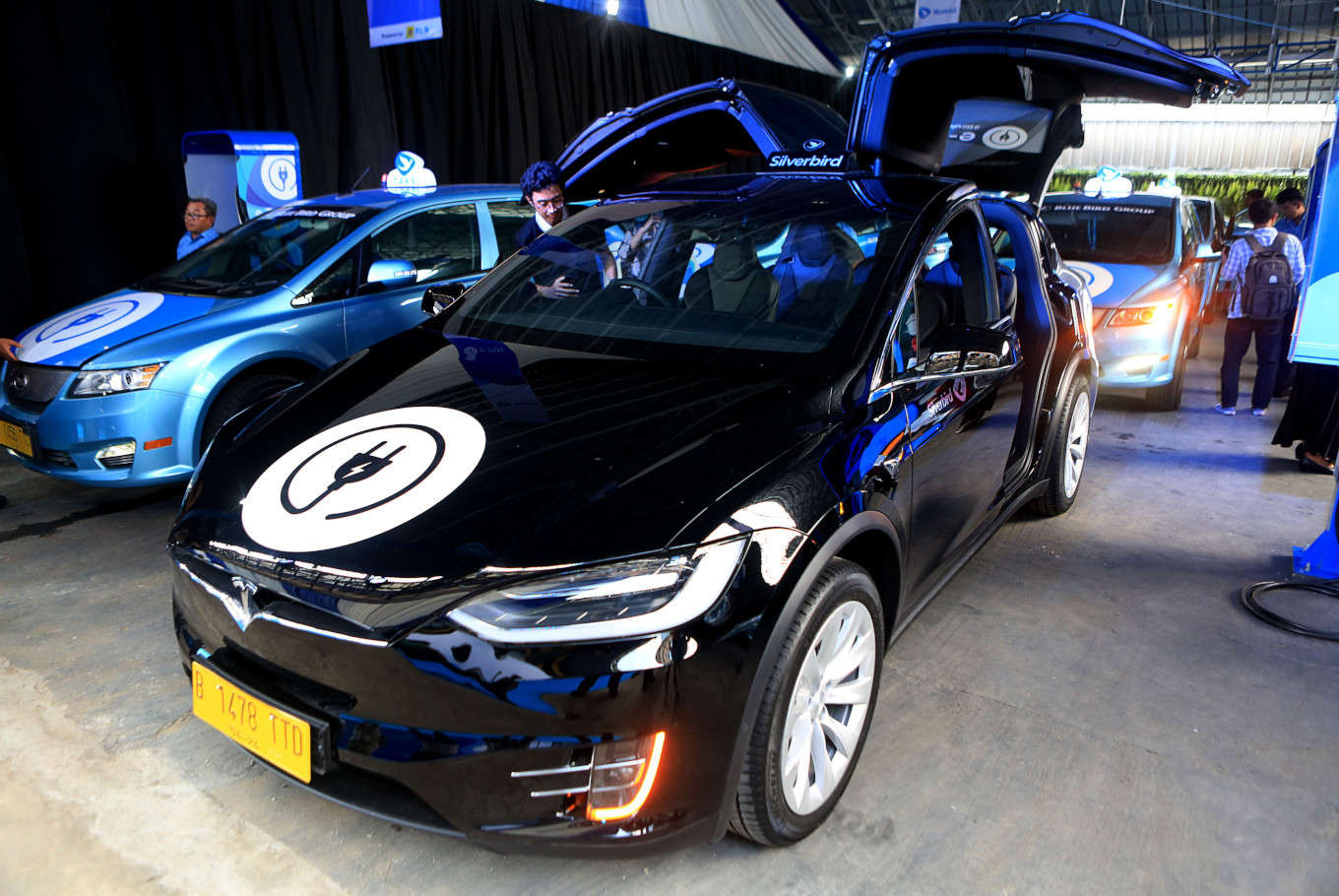Popular Reads
Top Results
Can't find what you're looking for?
View all search resultsPopular Reads
Top Results
Can't find what you're looking for?
View all search resultsIndonesia to develop circular economy for EVs, boost battery industry
Indonesia expects the local automotive industry to begin domestic EV production by 2021 or 2022 to reach the target of exporting 200,000 electric cars by 2025.
Change text size
Gift Premium Articles
to Anyone
I
ndonesia intends to adopt a circular model for its up-and-coming electric vehicle (EV) industry — a new industry driven by rising concerns over the climate crisis — and plans to partner with global manufacturing giants to produce EV batteries.
Doddy Rahadi, the head of the Industry Ministry’s industrial research and development agency (BPPI), said the government was accelerating the development of battery-powered EVs and had rolled out initiatives and incentives to boost the growth of the industry.
However, he warned about the waste the EV industry could produce.
“The negative effect of electric vehicles is in the amassing of lithium battery waste due to their limited lifespan and charging cycles,” Doddy said in a webinar on Wednesday. “In this case, the Industry Ministry is pushing for the development of battery technology that carries the concept of a circular economy.”
He further explained that as Indonesia did not have the natural lithium reserves needed to produce the battery, the ministry had initiated the process of recovering lithium from recycled batteries in a process known as urban mining.
He went on to say that an orientation of substituting imports had to be implemented from the early stages of developing the EV industry in the spirit of reducing Indonesia’s reliance on imports.
While short in lithium, Indonesia is the world’s largest nickel ore producing country. Nickel is a key ingredient in EV battery production. Analysts have said that the country's nickel industry would benefit from the growth of the EV industry.
Indonesia is setting its sights on becoming a major player in this new electric-powered transportation economy. Under President Joko “Jokowi” Widodo’s administration, the local automotive industry is expected to begin domestic EV production by 2021 or 2022 to reach the target of exporting 200,000 electric cars by 2025. The number accounts for around 20 percent of the expected total of 1 million cars exported a year.
Read also: Consumers’ concerns hamper electric vehicle adoption in Indonesia: Experts
The Industry Ministry reported that so far, the country has one local producer of four-wheel or more EVs, PT Mobil Anak Bangsa (MAB), which produces electric buses with a production capacity of 1,200 units in a year.
For two- and three-wheel EVs, the country has 15 producers with a total production capacity of 877,000 units per year, with brands including Viar, Gesit, Selis and MIGO.
“What supports the success of battery-powered electric vehicles is the development of the battery industry,” Dodiet Prasetyo of the Industry Ministry’s metals, machinery, transport equipment and electronics industry (ILMATE) division said during the webinar, signaling the government's commitment to propping up the EV ecosystem.
Dodiet went on to say that the government had formed a consortium between state firms, consisting of mining holding company MIND ID, oil and gas company Pertamina and electricity company PLN, tasked with producing EV batteries for the industry.
The State-Owned Enterprises (SOE) Ministry ordered the three giants in mid-October to establish a holding company, tentatively named PT Indonesia Battery Holding, that will develop an end-to-end supply chain for EV batteries. They are also in discussion with China’s CATL and South Korea’s LG Chem to invest between US$12 billion and $20 billion to develop the planned supply chain.
Dodiet said other possible global manufacturers were American EV company Tesla, Japanese multinational electronics company Panasonic, Japanese joint venture EV battery manufacturer Automotive Energy Supply Corporation (AESC), South Korean Samsung SDI, German Bosch and South Korean SK Innovation.
“We are hoping that in the near future, there will be a collaboration between state firms and one of these global manufacturers to come to Indonesia and invest, collaborate, to build the battery industry,” Dodiet said. “If there is a battery industry in Indonesia, hopefully, the price of EVs in the market will be more competitive.”
The price of EVs is notably higher than conventional vehicles, which is a major reason behind consumers’ reluctance to make the electric shift. In a webinar held on Oct. 14, Danareksa chief economist Moekti Prasetiani Soejahmoen said that in addition to high prices, consumers were worried about running out of power and the lack of charging stations when it comes to adopting EVs.
Yucuanto Susetyo, director of PT Kencana Laju Mandiri, the company behind two-wheel EV brand Viar Motor Indonesia, said the benefits of a possible entry of global manufacturers into local EV production would outweigh the risks.
“With their entry, we hope it can raise the quality of human capital in the EV sector and increase Indonesia’s competency of the EV component industry,” he explained, noting that some protection might be necessary.
“With the entry of global brands, the business of national brands must be considered. Maybe national brands needed to be given privileges so that we, too, can survive.”










